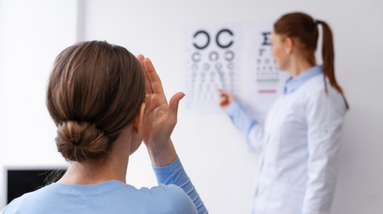
Eye examination is a process of evaluating the vision and overall health of the eyes. This examination can be done by an optometrist or an ophthalmologist, and it usually includes various tests to check the visual acuity, eye movements, eye pressure, and the overall health of the eyes.
During an eye exam, the optometrist or ophthalmologist may ask about the patient’s medical history, including any vision or eye problems in the past, and any medications or supplements that they are taking. The doctor may then perform a series of tests, such as the Snellen eye chart to check visual acuity, the slit-lamp examination to check the front part of the eye, and the dilated eye exam to check the back part of the eye, including the retina and optic nerve. Other tests that may be performed during an eye exam include tonometry to measure eye pressure, color vision tests, and visual field tests.
Eye exams are important for maintaining good eye health and detecting any vision or eye problems early on, which can lead to prompt treatment and prevention of vision loss. It is recommended that individuals undergo regular eye exams, depending on their age and risk factors, as recommended by their eye doctor.